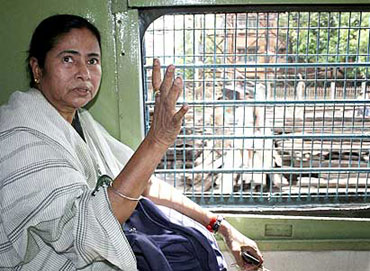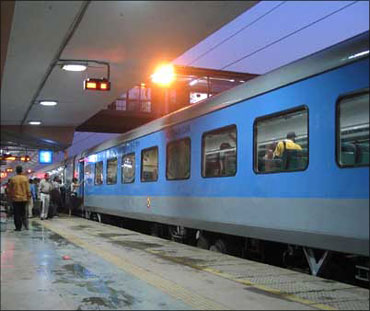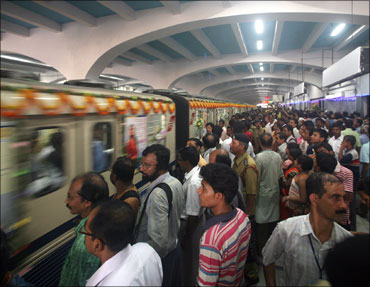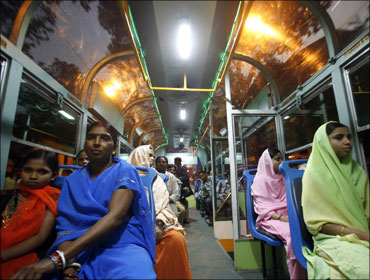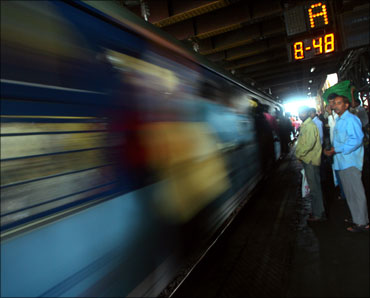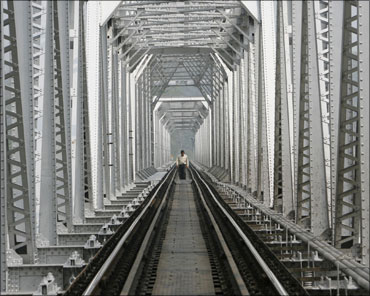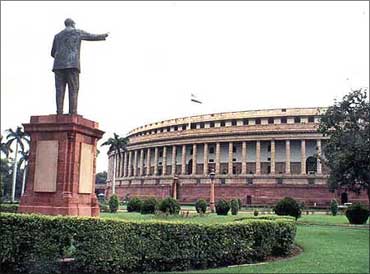 | « Back to article | Print this article |
Why a separate Rail Budget isn't necessary
A Central Administrative Tribunal order has recognised the need to do away with a separate Railway Budget
Rarely do the orders of the Central Administrative Tribunal go beyond redressing the grievances brought before it by employees of the government or other state-controlled organisations.
However, the order passed by the Patna bench of CAT in the middle of this year is an exception.
It has revived the dormant debate over reforming the Indian Railways with arguments with which few can disagree.
Click NEXT to read further. . .
Why a separate Rail Budget isn't necessary
It has also sent alarm signals to Railway Minister Mamata Banerjee.
For, if the finance ministry pursues the CAT order to its logical conclusion and the government agrees with the CAT perspective, Banerjee may not be able to present a Railway Budget next year.
The CAT order pertains to the plea of a retired Indian Railways official that his pension entitlement should be more than what the government has approved.
While presenting his case, the official made the Indian Railways a party and argued that the railway ministry presents a separate Budget to Parliament and, therefore, CAT should direct it to earmark additional funds to meet the higher pension liability arising out of his plea.
Click NEXT to read further. . .
Why a separate Rail Budget isn't necessary
The Patna bench of CAT dismissed the plea, but added by way of obiter dicta the need to dispense with the system of presenting a separate annual Budget for the Indian Railways.
The two-member CAT bench, headed by Justice Anwar Ahmad and Sudhir Kumar, made interesting observations.
It said there was no provision in Article 266 of the Constitution for the Union of India to provide for a division of the presentation of the public accounts of the central government in two separate Budgets.
In effect, the bench rejected the current practice of presenting a separate Railway Budget in respect of the public accounts of the railway ministry, in addition to the General Budget pertaining to the rest of the Consolidated Fund of India and the rest of the public accounts of the Union of India.
Click NEXT to read further. . .
Why a separate Rail Budget isn't necessary
The Patna bench was not content with just declaring that the Constitution had made no separate provision for presenting the Indian Railways' accounts to Parliament.
It went further by opining that the presentation of a separate Railway Budget resulted in the violation of the provisions of Article 269 of the Constitution.
It also found a separate Railway Budget an infringement of the rights of the states under Articles 269 and 270 of the Constitution.
Article 269 of the Constitution refers to the manner in which the Union government will transfer to the states the revenues it collects from certain taxes.
Article 270 of the Constitution refers to the manner in which the Union government will share with the states the revenues it collects from certain taxes.
The CAT argument was that a separate Budget for the Indian Railways effectively deprived the states of any proportion of the money received by the Union government through the Railway Budget.
Click NEXT to read further. . .
Why a separate Rail Budget isn't necessary
Explaining further, the CAT order observed that the redistribution of Railways revenue among the states remained outside the purview of the Finance Commission created under Article 280 of the Constitution.
The Finance Commission, therefore, did not determine the principles that should govern the grants-in-aid that should flow to the states from the Union government's railway revenues.
"We, therefore, feel obligated to observe as obiter dicta that the practice hitherto followed of presenting a separate Railway Budget by the Union of India is un-Constitutional," the order stated.
Click NEXT to read further. . .
Why a separate Rail Budget isn't necessary
The Patna bench of CAT even found a way out of what it considered an 'un-constitutional' practice.
It recommended that the government should implement the recommendation of the Sixth Central Pay Commission (and indeed many other committees) to corporatise the Indian Railways, so that it could have a separate corporate budget, which would not require its presentation before Parliament in its present form.
Therefore, there would be no violation of Article 266 of the Constitution.
In such a scenario, the Indian Railways' corporate budget would be like any other budget of public sector undertakings, presented as part of the General Budget.
In a bid to drive home its point, the CAT order added that it was not impossible to have railway operations under a corporate structure since the country already had a successful example of running railway operations under the Konkan Railway Corporation Limited.
Click NEXT to read further. . .
Why a separate Rail Budget isn't necessary
"Perhaps such an objective of the corporatisation of the Indian Railways can be achieved very quickly by a reverse merger of the Indian Railways into the corporate structure of the Konkan Railway Corporation to create the proposed Indian Railways Corporation as soon as possible," it said.
It is true that the Patna bench of CAT qualified these pronouncements as obiter dicta and not an order immediately prohibiting the presentation of a separate Railway Budget, until the government examines the Constitutional position and amends the law.
However, everyone in the government is aware of the growing irrelevance of a separate Railway Budget and its blatant use by the railway minister as a tool to gain political mileage.
The need for corporatising the Indian Railways has never been as acute as it is today.
The CAT order may be a god-sent opportunity for the government. Implementing it can help the government kill many birds with one stone!
